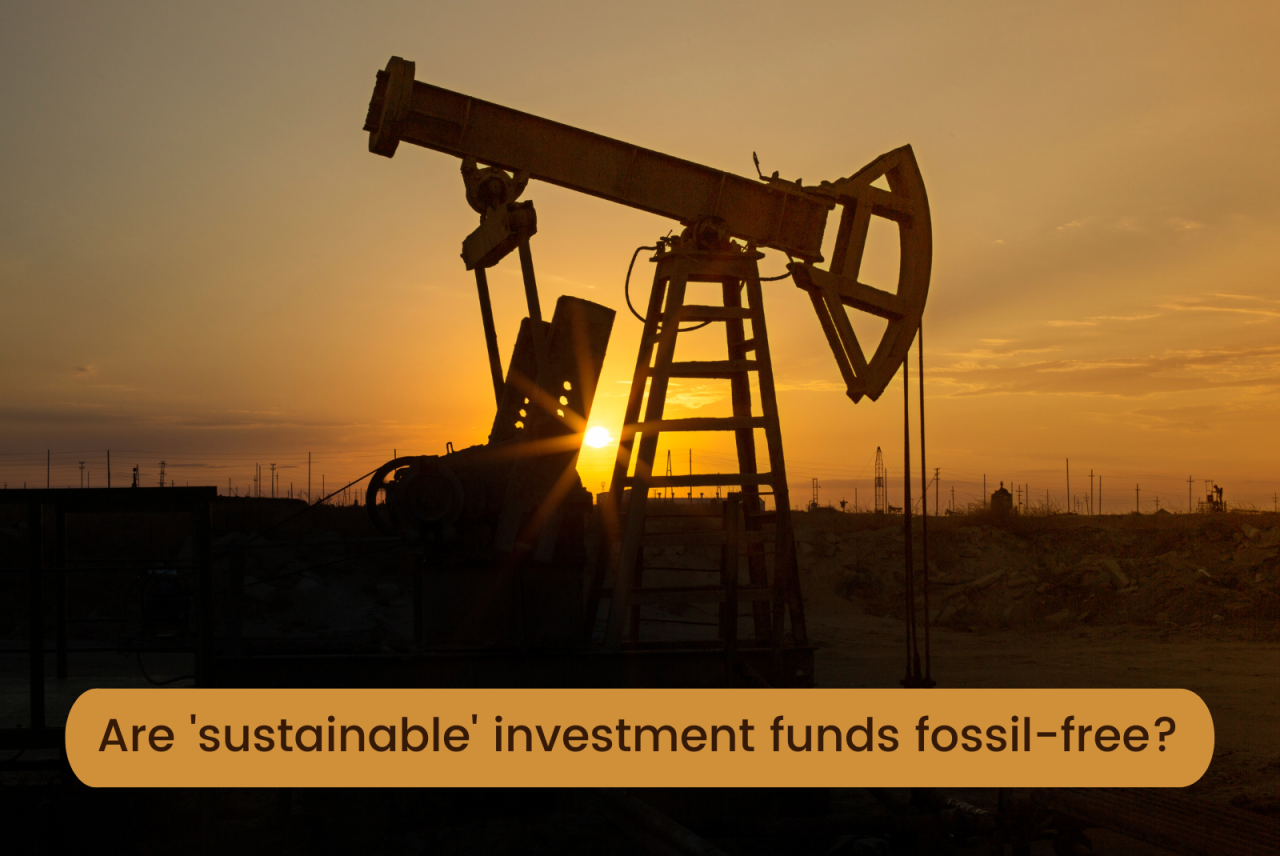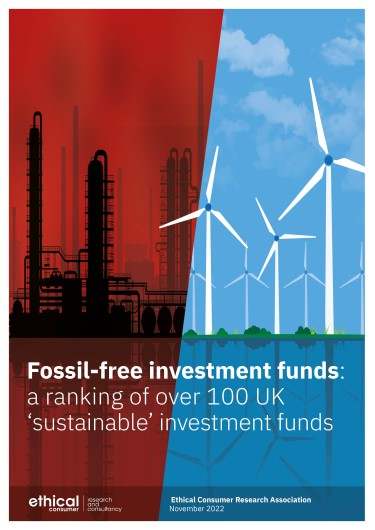New research ranks the climate policies and fossil-fuel divestment criteria of more than 100 ‘sustainable’ UK funds and trusts
28th November 2022

28th November 2022
Given the existential threat to the environment and humanity posed by the climate crisis, we need to stop burning fossil fuels as quickly as possible. Ethical Consumer therefore believes that investment funds which are marketed under the banner of ‘sustainability’ should, as a minimum, avoid investing in the fossil fuel sector.
According to research into the oil and gas sector across thirty-three countries, published in the Journal of Economic Geography, divestment can reduce access to capital for fossil fuel companies and make further exploration more difficult.
We have ranked the climate policies and fossil-fuel divestment criteria of more than 100 of the largest ‘sustainable’ UK funds and trusts to cut through the greenwash and open up the discourse around the practicalities of fossil-fuel divestment.
Our five-star rating system aims to drive transparency, highlight best practice, and challenge the reliance on ‘engagement’ strategies in the UK asset management sector.
The ratings in this report are also designed to give consumers the confidence to make climate-conscious investment decisions across a range of fund types, including unit trusts, pensions, and investment trusts.
Nearly a quarter of funds/trusts, 23 out of 108 products, invested in companies on the Carbon Underground 200™ (a list of the 200 largest global publicly-listed coal, oil, and gas reserves owners in the world, compiled by FFI Solutions) or were not disclosing sufficient information for us to know. [1]
And 18% of funds invested in companies on either the Macroclimate®30 (a list of the 30 largest public company owners of coal-fired power plants in Developed Markets plus China and India, compiled by Macroclimate), or top ten oil services/infrastructure list (the top-ten leading oil equipment and oil services providers based on revenue), or were not disclosing sufficient information for us to know. [2]
The fund with the most holdings on these indices was the iShares Dow Jones Global Sustainability Screened. This product owned stakes in 17 companies on the Carbon Underground 200™, including Anglo American, ConocoPhillips, Royal Dutch Shell, Tata Steel and TotalEnergies. It was also invested in one company on the Macroclimate®30 (Duke Energy), and three companies on the top ten oil services and infrastructure list: Enbridge, Haliburton and Schlumberger.
The ASI Sustainable Index World Equity Pension owned the second highest number of investments across these lists. It had eleven holdings on the Carbon Underground 200™, including BP, INTOCHU and Inpex. It also had five holdings on our top ten infrastrtucture list, including Enbridge, Halliburton, and Schlumberger.
Overall, the exchange traded funds (ETFs) sector was the worst performing investment category in our fossil-free funds research. Each of the ten ETFs analysed scored less than half marks in the ratings.
The sector did have strong portfolio transparency compared to other fund types, with each of the ETFs in the table disclosing all their holdings. However, the passive investment approach taken by ETFs weakened the climate credentials of these funds.
The underlying indices of these funds failed to provide a clear commitment to exclude producers/extractors of coal/oil/gas, and their methodologies provided no evidence that they are focussed on investing in solutions to the climate crisis.
The research found that 20% of rated ETFs were invested in companies on both the Carbon Underground 200™ and Macroclimate®30 + top ten infrastructure list.

Our research of over 100 of the largest ‘sustainable’ UK funds and trusts found that:
Along with a detailed methodology, the report presents the findings overall for the 100+ funds, as well as by type of fund separately i.e. unit trusts, life funds, pension funds, investment trusts, offshore funds, and exchange traded funds.
There are also case studies examining some of the fossil-fuel companies found in sustainable funds.
By publishing detailed rankings on UK retail funds based on their commitment to divesting from fossil fuels, we hope to:
(a) Help open the discourse around divestment more generally.
(b) Provide specific pressure on lower ranking funds and the industry more widely to take divestment more seriously.
Rankings should also help improve transparency and fossil-fuel policy disclosure across the entire sustainable fund market in the UK, and give both investors and fund managers the tools and confidence to fully engage with a divestment discourse.
Over time, our ratings will hopefully help the sustainable and other funds sectors to shift assets away from fossil-fuel industries into enterprises that are working to make the low carbon economy a reality.
Ethical Consumer would like to thank the following organisations for their assistance and support for the sustainable funds rating project.
The research was funded by the Friends Provident Foundation.
As You Sow provided valuable advice and support that helped Ethical Consumer formulate the ratings system.
FFI Solutions allowed Ethical Consumer to use its latest Carbon Underground 200™ list in the holdings analysis phase of the research.
MACROCLIMATE permitted Ethical Consumer to use its Macroclimate® 30 index in the holdings and analysis phase of the research:
[1] 11 funds (10%) had holdings on the CU200, while 12 (11%) did not disclose their holdings, so were assumed to have holdings on the CU200.
[2] 7 funds (6%) had holdings on the Macroclimate or top ten infrastructure list, 12 (11%) did not disclose their holdings, so were assumed to have holdings on the Macroclimate or top ten infrastructure list.
[3] 14 funds (13%) did not publicly disclose their holdings. However, only 12 funds (11%) were assumed to have holdings on the CU200 and Macroclimate/infrastructure lists. This is because the Quilter Climate Assets Balanced Fund and Quilter Investors Ethical Equity didn’t publicly disclose their holdings, but did disclose them to us when we sent them our research for comment. These funds did not contain any holdings on the CU200™ or Macroclimate®30, but were penalised in our scoring system for not disclosing their holdings publicly.